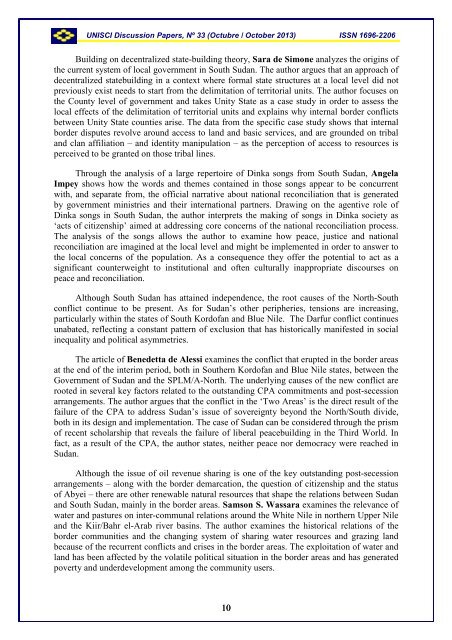UNISCI - Universidad Complutense de Madrid
UNISCI - Universidad Complutense de Madrid
UNISCI - Universidad Complutense de Madrid
Create successful ePaper yourself
Turn your PDF publications into a flip-book with our unique Google optimized e-Paper software.
<strong>UNISCI</strong> Discussion Papers, Nº 33 (Octubre / October 2013) ISSN 1696-2206Building on <strong>de</strong>centralized state-building theory, Sara <strong>de</strong> Simone analyzes the origins ofthe current system of local government in South Sudan. The author argues that an approach of<strong>de</strong>centralized statebuilding in a context where formal state structures at a local level did notpreviously exist needs to start from the <strong>de</strong>limitation of territorial units. The author focuses onthe County level of government and takes Unity State as a case study in or<strong>de</strong>r to assess thelocal effects of the <strong>de</strong>limitation of territorial units and explains why internal bor<strong>de</strong>r conflictsbetween Unity State counties arise. The data from the specific case study shows that internalbor<strong>de</strong>r disputes revolve around access to land and basic services, and are groun<strong>de</strong>d on tribaland clan affiliation – and i<strong>de</strong>ntity manipulation – as the perception of access to resources isperceived to be granted on those tribal lines.Through the analysis of a large repertoire of Dinka songs from South Sudan, AngelaImpey shows how the words and themes contained in those songs appear to be concurrentwith, and separate from, the official narrative about national reconciliation that is generatedby government ministries and their international partners. Drawing on the agentive role ofDinka songs in South Sudan, the author interprets the making of songs in Dinka society as‘acts of citizenship’ aimed at addressing core concerns of the national reconciliation process.The analysis of the songs allows the author to examine how peace, justice and nationalreconciliation are imagined at the local level and might be implemented in or<strong>de</strong>r to answer tothe local concerns of the population. As a consequence they offer the potential to act as asignificant counterweight to institutional and often culturally inappropriate discourses onpeace and reconciliation.Although South Sudan has attained in<strong>de</strong>pen<strong>de</strong>nce, the root causes of the North-Southconflict continue to be present. As for Sudan’s other peripheries, tensions are increasing,particularly within the states of South Kordofan and Blue Nile. The Darfur conflict continuesunabated, reflecting a constant pattern of exclusion that has historically manifested in socialinequality and political asymmetries.The article of Bene<strong>de</strong>tta <strong>de</strong> Alessi examines the conflict that erupted in the bor<strong>de</strong>r areasat the end of the interim period, both in Southern Kordofan and Blue Nile states, between theGovernment of Sudan and the SPLM/A-North. The un<strong>de</strong>rlying causes of the new conflict arerooted in several key factors related to the outstanding CPA commitments and post-secessionarrangements. The author argues that the conflict in the ‘Two Areas’ is the direct result of thefailure of the CPA to address Sudan’s issue of sovereignty beyond the North/South divi<strong>de</strong>,both in its <strong>de</strong>sign and implementation. The case of Sudan can be consi<strong>de</strong>red through the prismof recent scholarship that reveals the failure of liberal peacebuilding in the Third World. Infact, as a result of the CPA, the author states, neither peace nor <strong>de</strong>mocracy were reached inSudan.Although the issue of oil revenue sharing is one of the key outstanding post-secessionarrangements – along with the bor<strong>de</strong>r <strong>de</strong>marcation, the question of citizenship and the statusof Abyei – there are other renewable natural resources that shape the relations between Sudanand South Sudan, mainly in the bor<strong>de</strong>r areas. Samson S. Wassara examines the relevance ofwater and pastures on inter-communal relations around the White Nile in northern Upper Nileand the Kiir/Bahr el-Arab river basins. The author examines the historical relations of thebor<strong>de</strong>r communities and the changing system of sharing water resources and grazing landbecause of the recurrent conflicts and crises in the bor<strong>de</strong>r areas. The exploitation of water andland has been affected by the volatile political situation in the bor<strong>de</strong>r areas and has generatedpoverty and un<strong>de</strong>r<strong>de</strong>velopment among the community users.10
















